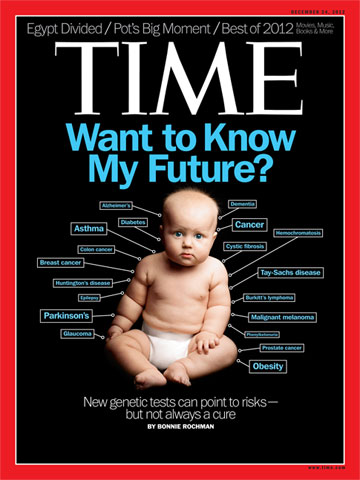
(5 of 6)
"Right now, it's not unusual for researchers to say that they're not returning results because there's no good way to do it," says Dr. Michael Bamshad, chief of pediatric genetics at the University of Washington, who works with Burke and is helping develop My46. Eventually, he predicts, "everyone will have their genome stored in a cloud."
Living with the Results
For Laurie hunter, the news of her own cancer risk was not actually a shock. The disease runs in her family. Her mother and aunt had breast cancer, and her brother died of testicular cancer when he was 27. "I'd resigned myself that it was part of my reality, but I didn't think about it being part of my kids' reality--not this young, anyway," she says. One of the genes she's missing increases her risk of extra-adrenal tumors, which can pop up in the head, neck, chest and abdomen. The average age of onset is 30. Hunter is 42. So she scheduled blood tests and a full-body MRI to see if any tumors had started growing. She was thinking not just of herself and Amanda but also of her son Ryan, 4, who has always been healthy, and of her youngest child Kailyn, who was born with a rare genetic disorder unrelated to Amanda's, called Wolf-Hirschhorn syndrome. At 2, she cannot talk and can barely sit up. "I have two girls, one of whom will never speak, and they need to be cared for by somebody," she says. "I worry about, if something happens to me, who will take care of them." And then there is Ryan. What if she had passed the cancer risk on to him?
"I have shed more than a few tears since I learned about this gene deletion," Hunter says. "I love all my children equally, but I have reconciled myself that neither daughter will ever drive, go to college, get married or live on her own. The hardest part is thinking about my son. I have this one child in whom all my hopes and dreams lie, and now he may have this deletion too."
She considered not testing him. Maybe ignorance would be better than knowing the worst. "But I thought, God forbid, what if he was one of the ones who develops tumors at 10 years old and I didn't know. I'd be consumed with guilt."
Ryan was tested in the last week of September. The waiting was a kind of torment. "We got the results back the other day," Hunter says. "He does not have the deletion. I feel like I can breathe again."
But because of Amanda's increased risk, she is being closely monitored. An MRI found a spot on her neck that turned out to be an enlarged lymph node. The doctors still don't know what is causing her other health problems.
"If all three of my children were healthy and had no issues, I don't know if I'd want to know about those seven missing genes," says Hunter, whose own MRI detected a lesion above her diaphragm. She's waiting to learn whether it's a tumor. "Sometimes what you don't know is easier. I feel completely overwhelmed with information. Now it just feels like a waiting game."
